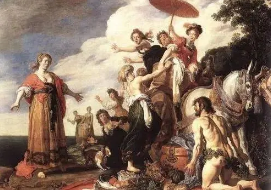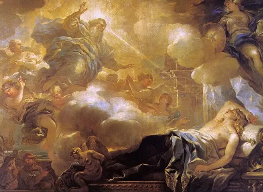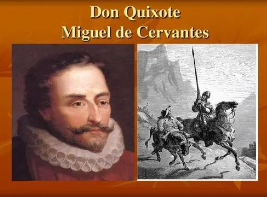The 80 most Common Allusions to Western Literature are so useful(I)
9 min read
Whether you’re talking to people or learning English, these 80 Western literary allusions will be of great use to you.1 Baptism It’s from the Bible. Adam and Eve, the first ancestors of human beings, committed a crime because they listened to the snake and ate the forbidden fruit. This crime has been passed down from generation to generation and is called “original sin”. Every man who disobeys the will of God also SINS, which is called “sin”. Therefore, anyone who believes in God must be baptized and cleansed of original sin and original sin. During baptism, the main baptismal mouth chanting, baptismal forehead or head, and also the whole body immersed in water, so baptism is also called “baptism”. To undergo some kind of exercise or test.
2 Forbidden Fruit:
(Genesis) Adam and Eve lived in the garden of Eden, and God allowed them to use its fruit, except from a tree of knowledge of good and Evil. But the cunning snake lured them to eat the forbidden fruit. As a result, knowing good and evil, distinguishing between true and false, the feeling of shame arose, and God expelled him from Eden. Snakes are also punished: they crawl with their flesh for the rest of their lives. It is a metaphor for something that is more desirable because it is forbidden.
The kiss of Judas:
Judas was one of the 12 disciples of Jesus Christ in the Bible. Although Jesus preached the New Word, which was supported by the people, it aroused the hatred of the Jewish elders and priests. They paid Judas 30 pieces of silver to help identify Jesus. When they went to the Garden to capture Jesus, Judas pretended to greet him and hugged and kissed him. Jesus was arrested and then crucified. The kiss of Judas was used as a metaphor for shameful treachery.
4 Song of the Siren:
It comes from Greek mythology. Legend on an island lived some enchanting and harmful siren with beautiful songs, called the king of the plug. After Odysseus passed through the island, was warned by the fairy Searcy, sealed the ears of his companions with wax, and tied himself to the mast. The companions rowed hard, and finally overcame the charming song. A metaphor for that kind of deceptive sweet talk.
5 The battle for Apples:
It comes from Greek mythology. Peleus, king of the Myrmidonians, and Thetis, the goddess, invited all the gods to their wedding, but Eris, the god of quarrels, was forgotten. Eris picked a quarrel and threw a golden apple into the banquet, saying that he was going to give it to the most beautiful goddess. Hera, Athena, the goddess of wisdom, and Aphrodite, the goddess of love, all competed for the golden apple, and it was awarded to Aphrodite. And that led to the Trojan War. A metaphor for trouble. Or to stir up trouble or discord.
6 Achilles’ Heel:
The only place Achilles could be stabbed. After he was born, his mother Thetis, the goddess of the sea, held his heel and dipped him in the River Styx, making him invulnerable except for his heel. A vulnerable place or Achilles’ heel.
7 Lotus fruit:
It’s from Homer’s Odyssey. On their way home, Odyssey’s ship was blown by wind and rain to a beach. After eating the local fruit, the companions forgot their hometown and relatives, forgot their purpose of going ashore, and forgot to go back to the ship. After metaphor living in a foreign land, happy not to think back.
August laurel It comes from Greek mythology. Apollo fell in love with the banshee Dahune, but she rejected his advances. Once Apollo met Dahune. Dahune immediately ran to the river and called to his father, the river God, for help. Her father changed her into a laurel tree. Apollo stroked the laurel and said, “If you cannot be my wife, you must at least be my tree. Your branches, O laurel, will forever cling to my hair, to my harp, to my quiver, and I will make the General of Rome wear your crown on his head in triumph, and your branches and leaves receive glory forever.” Then they gave crowns of laurel branches to good poets. Laurel and laurel are also used as symbols of victory and glory.
9 Utopia:
From the Greek ou(nothing) and topos(place), meaning “the land of Nothingness”. In 1516, the British Utopian socialist More in his book Utopia, described a vision of a good society, namely utopia. All means of production are owned by the whole people, and articles of daily use are distributed according to need. Everyone was engaged in productive Labour and had plenty of time for scientific research and recreation; There were no saloons, no brothels, no depravity, no sin… . So the word refers to an unattainable ideal or a utopian society.
10 Kafkaesque transformation:
Kafka was an Austrian writer who wrote a novel called The Metamorphosis. The hero of the book is Gregor. Samsa is a salesman for a company. He was devoted to his duties and obeyed the rules, and spent many years toiling away at selling goods. When he woke up one morning, he suddenly found himself transformed into a “big beetle”. His heart was full of fear and pain. His parents were very sad about his change, and his sister began to sympathize with him. He gradually lost his human habits, “insect” aggravated, he lost his job, his father hated him dead, mother, sister also turned from pity to hate, neighbors ashamed to be neighbors. He died alone. This is a metaphor for when a person suffers a sudden misfortune and becomes a burden to others, his relationship with the people around him will also change. This change removes the veil of warmth between people and exposes the naked interests.
11 The lost generation:
A genre of literature popular in the United States in the 1950s and 1960s. They are all young writers who negate everything with a nihilistic attitude, demanding to get rid of all traditional shackles, refusing to undertake any social and family obligations, and pursuing the so-called “absolutely free” life: drug addiction, alcoholism, theft, homosexuality, etc. In art, it advocates abandoning traditional techniques and advocating random play. Most of his works are fragmented in form and passive and decadent in content, but to some extent, they reflect the rebellion against American society. After refers to the reality of dissatisfaction and inaction, even stained with bad habits of decadent young people.
12 Wall Street’s “Public Opinion”:
Wall Street is a street in New York, USA. In the 17th century, it was a trading center and a market for slaves. After World War II, it became an important financial center of the United States. Wall Street is the pronoun of American monopoly capital, and the “public opinion” of Wall Street refers to the will of American monopoly capitalists.
13A word number one:
A is the first letter of the English language, so it is often used to mean “first”. It first appeared in the shipping register of the famous British Marine insurance company Lloyd’s. All the best ships are registered in the register as “A1”; Sunken ships are registered on a black-bound book. Later, people called the best or the best “A-word number one,” and lists of bad news or lists made for some kind of persecution “blacklists”.
14. O. Henry technique:
O. Henry was an American short story writer in the early 20th century. He mainly wrote humorous novels, his works often “tearful smile” to soothe the little people in the cruel social reality of the blow of the heart trauma. He is good at exaggeration, satire, puns, etc., and he is especially good at arranging the ending of the story, which makes the fate of the hero change in one hundred and eighty degrees, leaving the reader stunned but convinced. After the general refers to this in the end of the peak turn, willow dark Ming mutation.
15 Mona Lisa’s smile:
Mona Lisa is the work of Leonardo Da Vinci. Painted in 1506, Mona Lisa is said to have been a famous Florentine beauty, reserved and unhappy. In order to make Mona Lisa smile from his heart, Da Vinci asked the orchestra to play music from her hometown. The meaning of this smile has been a mystery in the history of art for centuries. Often used as a metaphor for the charming smile of a young woman, or transliterated to a mysterious smile.
16 The paradise:
Originally an Indian Buddhist noun. It is also translated into “Land of Peace and Happiness”, “Land of Peace and nourishment”, “Land of Buddhism”, “Land of purity” and “Pure Land”, commonly known as “West Heaven”. Elysium is the land of “no suffering, but enjoying”. A metaphor for the happiest place or an ethereal place.
17 The Statue of the Citadel:
A statue of an armed deity in ancient Greece acting as defender of a city. The people of those days believed that as long as the Idol remained, the enemy could not break it. The main statues were Apollo, the sun god, Aphrodite, the goddess of love and beauty, and Athena, the goddess of wisdom. Later translated into a strong support and support.
18 Chivalry:
Knights were the lowest and largest class of feudal aristocracy in Europe in the Middle Ages. They gained the estates of Kings or great lords by serving in the cavalry. Because of the feudal division of European countries at that time, the lords in order to preserve and expand their power, they had to rely on the martial arts of riding, shooting and fighting. Therefore, both the king and the Lord were actually knights, which greatly improved the status of knights. Knights were admired because of the society’s respect for martial arts. The knight was clad in steel armor, with a hooded hood on his head, a straight sword with a cross handle at his side, a spear and a shield in his hand, and he rode a tall, fat horse. They often joust and fight, and flirt with the women of high society. It became an important subject of literary creation at that time, and there appeared the enduring “chivalric romance literature”. Later, Europeans often advocate martial arts, help the weak and weak, respect women, loyalty to love, defend the honor of the quality called “chivalry”. In addition, some young aristocrats in Italy in the 18th century copied the practice of knights in the Middle Ages and were willing to serve for some famous ladies. People ridiculously called these young aristocrats “knights in waiting”. Thus it became synonymous with a young man who worked for and courted a noblewoman.
19. Platonic love:
Plato was a famous idealist philosopher in ancient Greece, a disciple of Socrates and a teacher of Aristotle. In his dialogue book the Symposium, he expounded his views on love: Eros is the intermediary between man and god. He controls the world with his mysterious passion and makes man pursue eternal beauty with an irresistible desire. This quest is a progressive process of awareness. The lowest form of love is when the lover in love “concentrates on the right and square form” and longs for union with the other person’s body. The higher form of love is the sublimation of beauty from the beautiful form to the loving form. The highest form of love is the contemplative beauty, that is, the beauty without the emotional form. He thus put forward the idea of the combination of truth, goodness and beauty as the highest ideal. Later, people call the non-sexual and idealized mutual love between men and women Platonic love, or spiritual love in modern language.
20 Nirvana:
The old translation is “Nihuan” and the free translation is “extinction degree”. Or “general Nirvana”, paraphrase “into extinction”, “death”. The highest ideal to be attained in all Buddhist practice. Generally refers to a spiritual state obtained through the practice of breaking the cycle of “life and death”. Buddhism believes that after a long period of “cultivation”, people who believe in Buddhism can “silence (extinguish) all troubles” and “complete” all “pure merit”. This state is called Nirvana. In Buddhist history, it is also commonly used as a proxy for death. Later, people wrote about Nirvana as a proxy for death.






